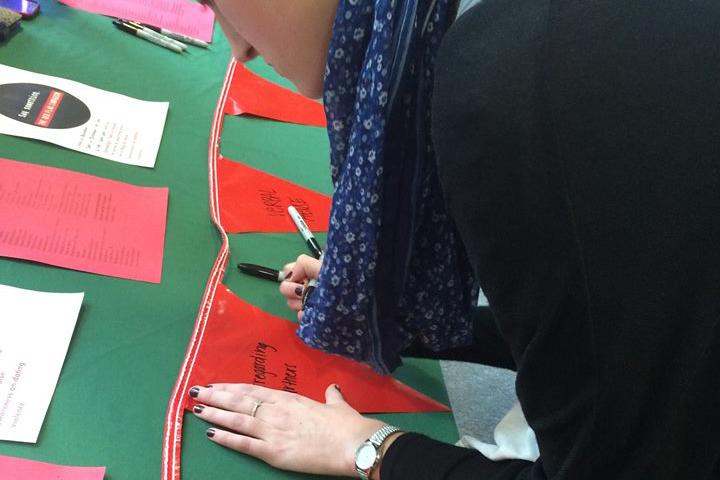Modern relationships are far removed from what they used to be. No longer do Millenials follow traditional relational constructs predetermined by their parent’s generation. Rather, many embrace the so-called hook up culture—the grey area between “going out” and “hanging out.”
But with that shift in what is considered a normal dating relationship, comes a shift in conversation. With talks about the hook up culture, comes discussion of the rape culture often associated with modern-day “dating.” And many times, the behaviors associated with normative relationships are also considered red flags for dating violence. And the only difference between those two things? The unknown intent of an unknown person.
Nevertheless, Loyola University Maryland’s Women’s Center has joined that conversation this year for its fifth participation in the Red Flag Campaign, aiming to spread awareness of the warning signs associated with dating violence—no matter if the relationship lasts one night or several years. Additionally, members pointed out that dating violence is not limited to taking place within only heterosexual relationships, but in all types of relationships.
Last week, Dr. Margaret Musgrove, director of Loyola’s Women’s Center, along with other representatives, sat at a table outside Boulder Gardens Café with several strings of red flags. On these flags, students were asked to write the warning signs associated with dating violence.
“The idea is to address stalking, abusive comments, you know, you see those—its really about warning signs,” said Musgrove.
Additionally, she explained that the words were pre-approved by Loyola’s Counseling Center so as to avoid triggering flashbacks or memories of victims previously or currently suffering from dating violence. These words were listed on a sheet of paper at the table, and students were allowed to write only the designated words.
“These words have been vetted by the Counseling Center,” said Musgrove. “[The lists are] there to make sure we do it in accordance with what they think is best. They don’t want people to feel vulnerable.”
Additionally, Musgrove elaborated on some of the red flags of dating violence:
What comes to mind primarily is hitting—no adult needs to be hit by another adult. I think that’s the most glaring example, but anything physically disrespectful. Another would be abusive words—being verbally abusive. I also think stalking or being overly in the person’s space and monitoring the person on their computer or physically—always checking up.
Musgrove explained that the benefit of writing the warning sings on red flags and hanging those flags around campus is that it allows students to participate in the national discourse in addition to potentially making an impact on campus by encouraging someone in an abusive relationship to seek help or have the confidence to end the relationship. The flags will be hung for the next week on the footbridge over North Charles Street, and in the student center.
“We want to help them understand that there’s a difference between love and being taken advantage of or not respected,” Musgrove said. “But the person has to take it upon themselves to get help.”
The Women’s Center offers support to anyone—of any gender—who is on the receiving end of dating violence. Musgrove explained that there are many underreported incidents of sexual and dating violence at Loyola, but the Women’s Center is often the place people seek for help about such situations, even if they never report.
“We do get people [who have suffered from] date rape…most of it is acquaintance rape,” Musgrove said. However, she said that many times those who talk to the Women’s Center staff about their experiences do not report those incidents to on-campus authorities or the police.
“We should really be talking about this and the legal ramifications of rape,” Musgrove said, explaining that oftentimes people do not understand what actions constitute rape or justify events based on the hook up culture, alcohol consumption and impaired judgment. However, just the fact that the victim’s judgment is impaired makes it rape.
“It lacks education.” Musgrove said, hinting at the shortfalls of the University and the apparent focus on upholding its reputation despite the problematic drinking and hook up culture on campus. “The reality is that we do have to discuss these issues and support the people who have had those issues. We can’t bury them under the rug anymore.”
If you or anyone you know has been sexually assaulted and you would like to talk about it, contact the Counseling Center at (410) 617-CARE (2273). The Women’s Center can be reached at 410-617-5844 or at [email protected].












































































































